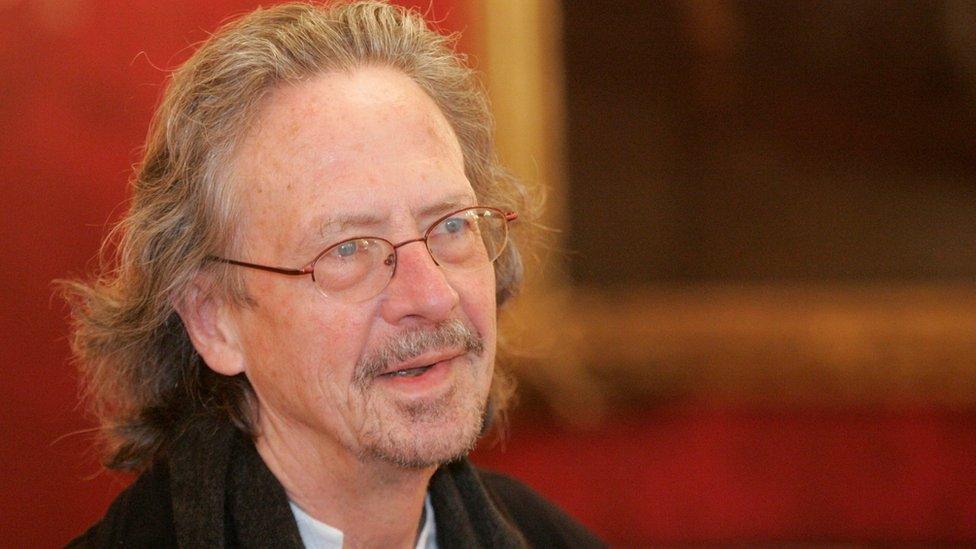Peter Handke receives Nobel Literature prize
- Published
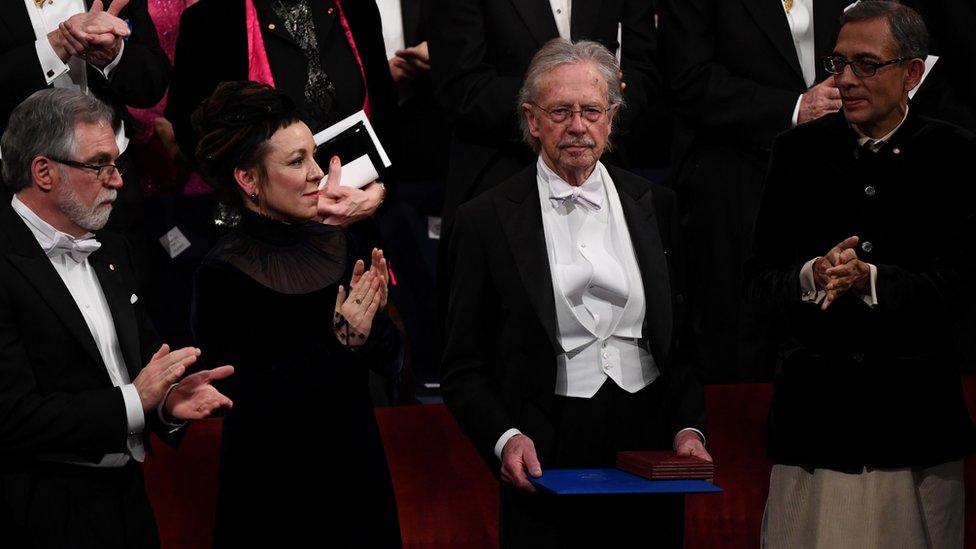
Peter Handke was applauded by the attendees at Tuesday's ceremony in Stockholm
Austrian author Peter Handke has received his Nobel prize for Literature at a ceremony in Sweden.
The choice of Handke was controversial because of his support for the Serbian side in the 1990s Yugoslav war.
The ambassadors of countries including Bosnia, Albania, Kosovo and Turkey boycotted the ceremony in protest.
Olga Tokarczuk, who is considered the leading Polish novelist of her generation, also collected her belated 2018 literature prize.
Handke, 76, was recognised for "an influential work that with linguistic ingenuity has explored the periphery and the specificity of human experience", the Academy said when the award was announced in October.
But a 58,000-strong petition called for the award to be revoked.
And as dignitaries arrived in limousines for the awards ceremony, about a dozen protesters waved placards with slogans such as "No Nobel for Fake News", reported Reuters news agency.
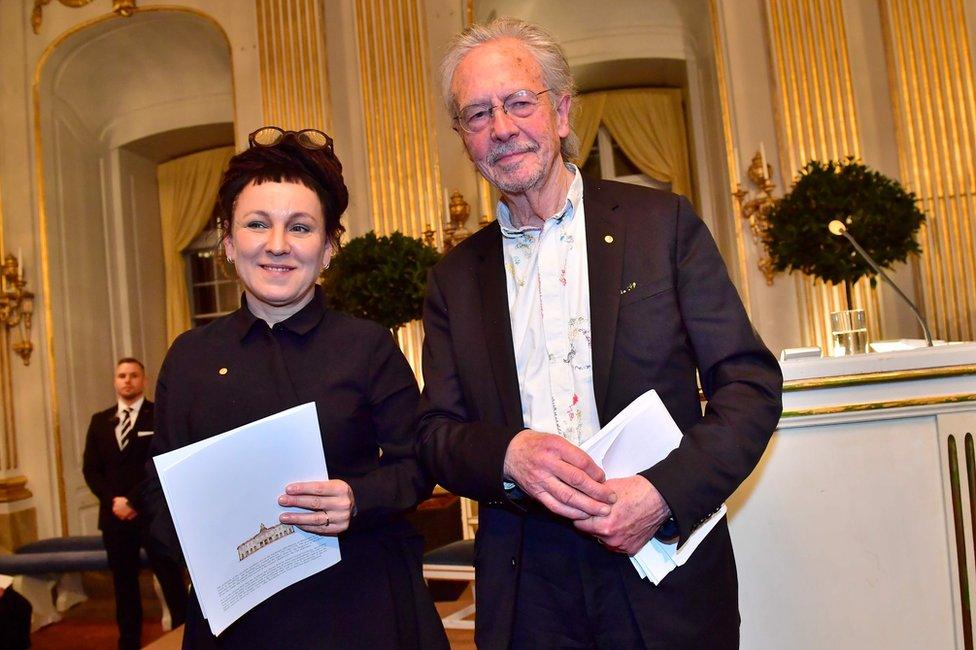
Olga Tokarczuk, pictured with Peter Handke, received the literature prize for 2018
"The problem with Handke is his refusal to admit genocide on the Bosnian population in the 1990s," said Adnan Mahmutović, one of the organisers of Tuesday's demonstration in Stockholm.
"As a serious, established writer who has a lot of clout in European literature, Handke has been used in the narrative of genocide denial in the Balkans," said Mahmutovic, who fled to Sweden as a refugee from the war in Bosnia in 1993.
Protest resignation
The choice of Handke came as the Academy struggled to recover from a sexual assault scandal that resulted in the 2018 prize being postponed and awarded this year to Polish author Olga Tokarczuk while Handke was named the recipient for 2019.
The assault controversy involved the husband of a former member, the poet and writer Katarina Frostenson.
French photographer Jean-Claude Arnault, who ran a cultural project with funding from the Swedish Academy, was accused by 18 women of sexual assault.
Several of the alleged incidents reportedly happened in properties belonging to the Academy. Mr Arnault denies the allegations.
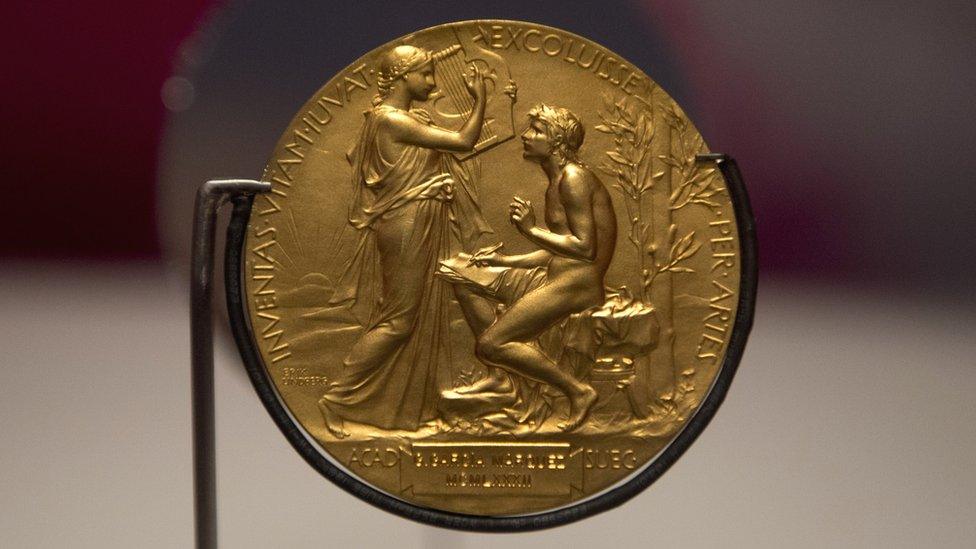
The Nobel Literature Prize winner receives a medal, a diploma and £740,000 in prize money
One external member of the Nobel literature committee resigned earlier this month over the choice of Handke.
Gun-Britt Sundstrom said the choice of Handke had been interpreted as if literature stood above politics and she did not agree.
Another external committee member, Kristoffer Leandoer, said he had left because Academy reforms following the sexual assault scandal were taking too long.
In a 1996 book, Handke cast doubt on the Bosnia Serb massacre of men and boys at Srebrenica and accused Bosnian Muslims of staging attacks.
In a TV interview in 1999, he compared Serbia's fate to that of Jews during the Holocaust - although he later apologised for that "slip of the tongue". In 2006, he spoke at the funeral of Serb leader Slobodan Milosevic, who was accused of genocide and other war crimes.
However, the Academy quoted a 2006 article in which Handke said the Srebrenica massacre was the worst crime against humanity in Europe since Word War Two.
'It's literature'
At a press conference in Stockholm on Friday, Handke avoided questions on the Balkan wars.
"I like literature, not opinions," he said.
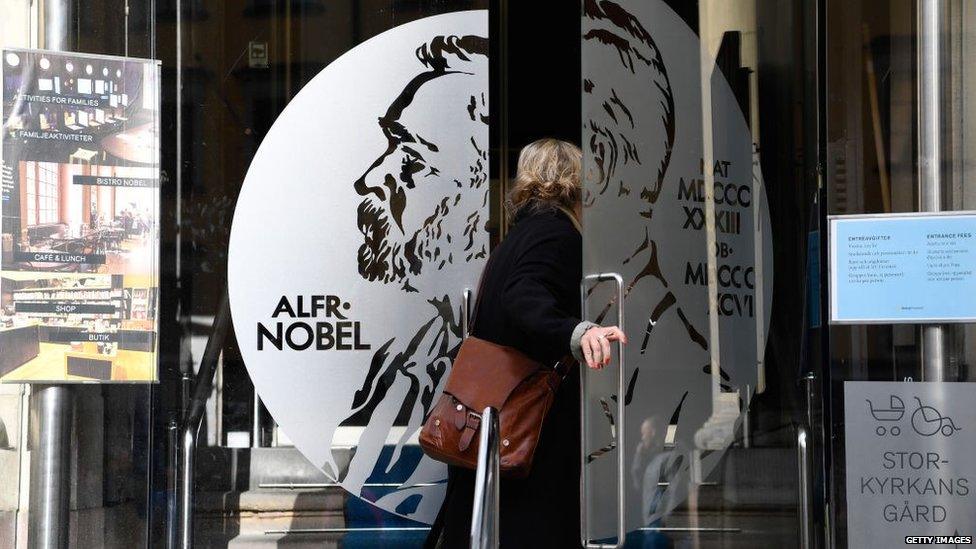
Alfred Nobel Museum in Stockholm holds the records for the Nobel Prize and its winners
But in an interview with German weekly Die Zeit in late November, Handke defended his writings.
"Not one word I have written about Yugoslavia can be denounced, not a single one. It's literature," he said.
He said that at the time "reporting about Serbia was monotone and one-sided," Handke told Die Zeit.
'Deserving winner'
One Nobel Committee for Literature member, Henrik Peterson, has argued that Handke is "radically unpolitical" in his writing, and his support for the Serbs has been misunderstood.
Mr Petersen is not the only committee member to defend Handke.
Rebecka Kärde said she didn't want to "apologise for the hair-raising things that Handke has undoubtedly said and done".
But she continued: "The Nobel committee must read the texts on Yugoslavia among another 70 works written over a period of 50 years. Which we did."
They concluded that the author of books including Repetition, My Year in the No-Man's-Bay and Die Obstdiebin "absolutely deserves a Nobel Prize".
She added: "When we give the award to Handke, we argue that the task of literature is other than to confirm and reproduce what society's central view believes is morally right."
Handke himself reacted angrily to the response to his win, telling journalists: "No-one who comes to me says that he has read any of my works, that he knows what I have written. It's just questions like how does the world react, reactions to reactions."
He said he would never speak to the media again, according to Austrian broadcaster ORF.
In 2014 Handke called for the Nobel Literature Prize to be abolished, saying it conferred a "false canonisation" on the laureate.

Follow us on Facebook, external, or on Twitter @BBCNewsEnts, external. If you have a story suggestion email entertainment.news@bbc.co.uk, external.
- Published18 October 2019
